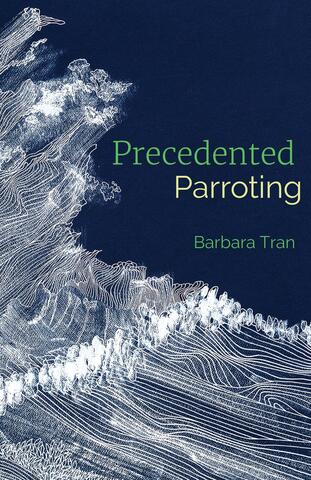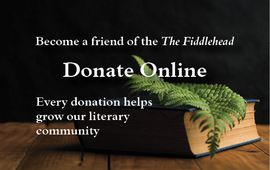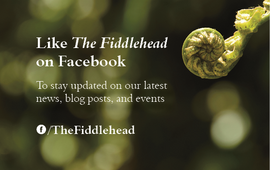
(Re)framing a Fragmented Biography
Precedented Parroting, Barbara Tran. Palimpsest Press, 2024.
How does one write one’s history when facts run fleet? How does one frame a biography when names and languages exist as disparate fragments, and community acceptance is seemingly conditional? These are the questions that populate Barbara Tran’s remarkable poetry debut, Precedented Parroting.
Tran’s book of poems is a tangle with memory in a variety of ways. The speaker fears it while also wrestling with historical familial gaps. This struggle resonates notably in the first section of the book through a delicately laddered metaphor. In the opening poem, “Raven Takes Wing,” the speaker admits from the start, “I am a willful forgetter.” She doesn’t remember where an ache in a wrist or neck comes from, which seems banal and harmless. But she then continues, “I summon memories like birds” and admits that if she separates herself from them, making them “pretty things”
The speaker continuously tries to send memory into flight. That memory is stained, an apology pictured as an egret and its echo, regret. She describes “falling / out of reason” as birds losing their feathers, forcing them to land. Memories that she wants to be free from end up like egrets,
feet planted
in thick
mud (14)
As demonstrated above, this poem ladders its way down the page, slowly building its concept across four pages, in flight. Fleeing and then, inevitably, landing again.
The metaphorical birds build further in “Blue from a Distance,” where feathers are explained as dead structures, each barb holding smaller barbs. Tran then lifts us further with:
each loss
encompasses smaller
the lines
where different parts
the body
into a teardrop
in Vietnamese chia buôn
sharing sadness (15)
Metaphorically, losses form a carapace. What looks like a device for flight is also pain and loss. The reference to the Vietnamese phrase for the first time indicates a diasporic dialogue across language and place.
Tran doesn’t leave this metaphor in a strictly negative frame. The narrator goes on to describe keratin as allowing space for light
to play Large
tail feathers can act
as a rudder help
with braking (16)
On the page, this poem has tercets that seem to continually want to travel the page, but at the end of each stanza, the poem is again justified left, contained but straining. Similarly, the lines are broken so there are no comfortably endstopped lines. The stutter of trauma comes across in how one inevitably reads this fragmented construction. Tran’s intelligent use of the page and the line continues throughout the book.
The narrative running through this collection is the speaker trying to piece together a family history in the absence of many concrete facts. Through the poems we understand that her family was split apart by the war in Vietnam, with the father travelling to the US to work as an aide (though even the definition of his job is steeped in competing narratives, most of the family initially being left behind. Although the rest of the family eventually moves to the US, the father remains an intriguing absence, working elsewhere in the country as his wife and children settle in New York. Much of his story is suggested in recollections of a photo album described by the narrator. The images have been placed in no particular order, their histories requiring further invention by the narrator. Nothing is fully reliable. And belonging is likewise a fractured concept:
be homesick? (35)
The frustration stemming from this lack of connection, or of being perceived as a negative “other” where you have lived most of your life, is again captured in bird-related metaphor in the title poem, where the speaker compares herself to a traumatized parrot:
I pace and rock I murmur
to myself I no longer
have feathers (24)
But birds also serve as a vision of being present and wholly oneself, powerful, as in a self-portrait as a crow:
The dead enter
my body
and not only rise
but sing as they do (102)
The bird imagery and connection serves not only as metaphor for individual struggle, but also as a reminder of the ecological balance of the planet, the interconnectedness of all things. Tran deftly approaches this connection, subtly floating it throughout the collection.
Tran stresses the unreliability of any narrator. I was left feeling that this fragmented family history echoes the fragmentation of many others. How well do we ever understand our parents? How much is inevitably reinvented in the telling? The struggle of the narrator is the culmination of that history, inevitably shapes its teardrop of trauma. As a reader, this voice remained reliable and powerful throughout. No history could ask for more.
— Robert Colman is the author of four poetry collections, the most recent of which is Ghost Work
(Palimpsest Press 2024).










